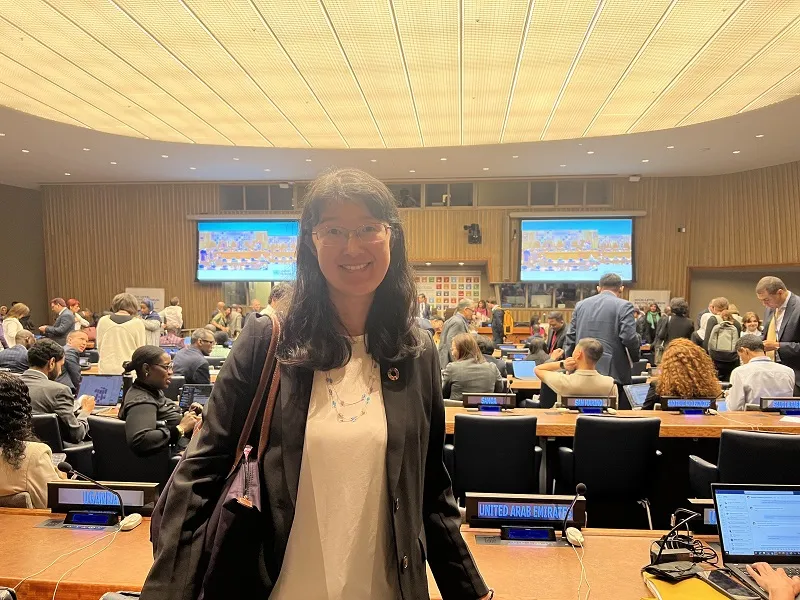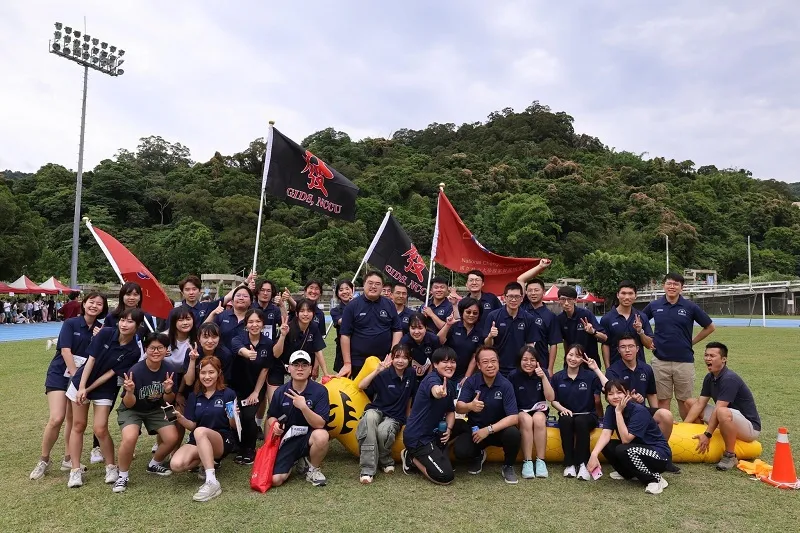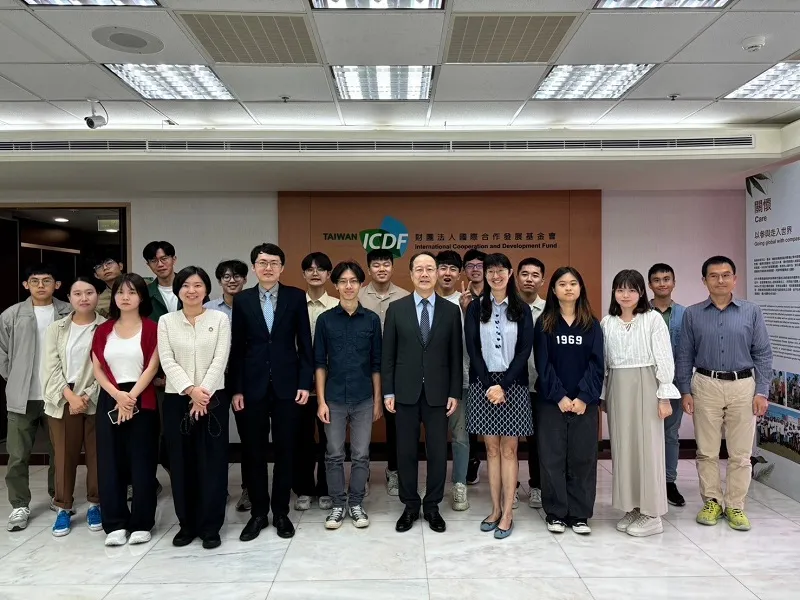I. Introduction
To understand who Professor Su Yu-Hsuan is, one needs only to stop by the Social Science building and observe one of her 9:00 AM classes. The classroom will be full, the whiteboard in use by some brave student volunteer sketching out a mathematical model, and the Professor herself will be delivering an animated lecture on development economics punctuated with stories from her fieldwork around the world. Her passion for the social sciences and ability to explain complex topics simply make her a dynamic presence on campus and an invaluable aid to students in the Graduate Institute of Development Studies (GIDS) and the International Masters’ Program in Applied Economics and Social Development (IMES) at NCCU. She brings a unique perspective from a lifelong journey of exploration that began in Taiwan, circled around the globe, and then brought her back to Taipei City and NCCU.

▲ Attended United Nation’s High-Level Political Forum on Sustainable Development in July, 2023
II. Interest in Economics and Academic Background
Professor Su’s journey in the field of economics began at a young age. Born in Taiwan to intellectual parents who fostered her curiosity, she discovered the discipline as a high school student when she was selected to attend a Humanities and Social Science camp held by the National Science and Technology Council in Taiwan. As a member of the inaugural cohort of this camp, she was exposed to all aspects of the humanities and social sciences. She was particularly drawn to the blend of mathematics and social science present in the field of Economics, and decided to pursue formal study of the topic during her undergraduate studies. Upon completing her undergraduate degree in Economics at National Taiwan University, she pursued a Master’s program at Yale University in the United States of America. On arrival at Yale, Professor Su found herself amongst the top minds in the world in the field of International and Development Economics, and she decided to focus her study in this area. She found many leaders in the field were using a microeconomic approach to study economic development, which was new to her, as in Taiwan she had primarily been looking at the aggregate indicators of economic development. At Yale, Professor Su realized that development can be broken down into small pieces or policy or intervention, and those things can be implemented one by one, allowing researchers to determine empirically which work and which does not. She was curious to see that many development interventions were carried out by nonprofit or international organizations, a finding that contrasted with the economic studies she had undertaken before. Where her previous coursework had focused on firm and consumer behavior, budgets, and profits, the economists she learned from at Yale were focused on the development of communities and people.
This revelation shaped her career trajectory, and she decided that she personally was interested in applying utility maximization to help people learn better, grow better, and lead healthier and happier lives. Professor Su said: “At Yale, I was developing a more holistic view of economics. At the same time, I was discovering the world. I had been abroad as a tourist before I studied abroad, but it was during my time at Yale that I realized how much more of the world was out there: like South America, Africa, and South Asia. I learned so much about all of these different countries with large populations and vibrant economies, and I wanted to know more. In Taiwan, development economics is not as large of an area of study as it was at Yale, and I believed my market for this work would be found overseas. I was [torn between] going directly into my field after graduating at Yale and pursuing further academic study, and ultimately decided to continue my education.” With the goal of improving both her English language abilities and her academic toolkit, Professor Su enrolled in a PhD program at the University of Washington in the United States.
III. Professional Work
During her PhD study, Professor Su worked for the World Bank in Washington D.C., and conducted field studies and other work in the Dominican Republic, rural China, India, and Ghana. About her experiences working with diverse populations, Professor Su said: “I have been blessed to benefit from diverse and international perspectives throughout my career, and I enjoy learning from all different kinds of people. For example, [the year after I joined NCCU] I had the opportunity to work in Henan, China, and it was the most difficult living experience I have had to date, but allowed me to see firsthand the very unequal living situations in China. Additionally, I've joined NCCU’s university social responsibility (USR) project in Wenshan District, where I worked with disadvantaged adults and children, alongside a very diverse student population from NCCU. It has been a privilege to see different people’s experiences of the world.”
After working and studying overseas, Professor Su made the journey back to Taiwan to join NCCU’s GIDS program as a faculty member in her hometown of Taipei. Now an Associate Professor, she teaches four courses in the GIDS and IMES programs: Development Studies: Economics Approach, Development Economics: An International Perspective, Quantitative Research Methods, Poverty and Inequality in the Era of Urbanization, and Applied Microeconomics.

▲NCCU sports day with GIDS in May, 2024
When asked how her past work with developmental organizations in the field shaped her teaching philosophy, Professor Su shared the following: “My fieldwork influenced my teaching. Poverty and Inequality in the Era of Urbanization, in particular, is a course created out of my own interests. In this course, we focus on all human issues, from birth to death, that are relevant to the human development goals and the economy at large, within the current era of urbanization. Nowadays we face new challenges and constraints in our urban societies, like crowded population centers, a lack of infrastructure, prevalence of urban slums, and many others. I share what I learned in the field with students, both my successes and failures. For example, one time I was attempting to conduct a survey in the slums of Mumbai, India. I worked with my Indian colleague in Seattle to translate my survey materials into Hindi and worked with local teachers to translate them into Marathi, but found upon arriving in the slums that most of the local mothers that I was trying to survey were illiterate. Adapting to that challenge was a learning experience, but it showed me the extreme inequalities in educational attainment that are prevalent even in the largest city in India at that time.” Professor Su’s diverse experiences equipped her to prepare students in the GIDS program for careers in development economics and international development, which are emerging disciplines in Taiwan.
Professor Su shared: “In recent years, Taiwan has become more and more established [in the field of development economics and international development]. Although we are not a member country of the United Nations system, Taiwan’s International Cooperation and Development Fund (ICDF) has tried very hard to align with the practices of the World Bank and the Organization for Economic Cooperation and Development (OECD). I encourage students who are interested in International Development to pursue vacancies and travel opportunities with these organizations, especially while they are still young! Also, Taiwan is a member country of some international organizations such as the Asian Development Bank (ADB) and the European Bank of Reconstruction and Development (EBRD). There are still some international organizations that Taiwanese have access to, but we must know the field and be aware of the dialogues that are being held worldwide [if we are to enter these spaces]. My goal as an instructor is for my courses to be a window for my students to access these dialogues, understand what methods are being used, what topics are being discussed, and what these organizations care about, so that they can contribute.”

▲ Completion of the 6th year of GIDSxICDF courses in November, 2024
Professor Su emphasized the importance of bravery and putting yourself out there as a young person building a career: “There are many English-taught courses at NCCU with diverse international populations, and I encourage my students to be brave and do their best to interact with the international population as much as possible. From my own experience, I can share that international friendships offer connections to the rest of the world. When I was a student myself, I had a strong interest in Africa, and wanted very badly to visit. So I talked to a visiting scholar within my academic department at the time who was from Africa. I spoke to her at a seminar and shared that I would like to visit Africa, and she encouraged me to submit a paper to a specific academic conference. I applied and was accepted but had no money to go. I spoke to the visiting scholar again, and she guided me to a travel fund provided by the United Kingdom’s Royal Economic Society. I would not have thought to apply to this, because I am not from the UK, and have not studied there, but I did apply and was surprised to receive funding for my travel. I encourage students to go out, meet people, and apply for opportunities, because you never know when you’ll be surprised by one. There is nothing to lose, and people are usually very friendly. [Your time as a student] is a very precious period of life to build connections and take advantage of opportunities.”
Although Taiwan does not have the same status globally as some other countries in the world today, Professor Su expressed confidence that the ongoing contributions of NGOs, government entities, and motivated students in the field of international development make it a promising place for interested young professionals to begin their careers. Professor Su considers her home department of GIDS a good environment for students and faculty. “In my undergraduate department, there were about 150 students per cohort. In GIDS, we only have around 20 students, and this makes the department feel like a small family. We have a really wonderful team of faculty and administrative staff, and the whole program is cozy and close-knit.”
When asked about her most treasured accomplishments at NCCU, Professor Su shared: “In the GIDS department, we have many students from interdisciplinary backgrounds, with varying familiarity with certain economic topics and quantitative methods. I am still learning to teach to this wide range of abilities, and it can be challenging to adapt the material to the different skill levels in my courses. I encourage students who may not have strong quantitative backgrounds by telling them that if they were admitted to NCCU, a top university in Taiwan, I have confidence that they possess the skills to learn the materials covered in my courses. It is a highlight of my teaching experience when a student who has a limited quantitative background on arrival at NCCU is able to write an excellent quantitative thesis after taking my courses.”
IV. Life Outside of Work
About her life outside of work, Professor Su shared that she enjoys community activities with her family, volunteering with her church, and spending time with her son. “Raising a son was a learning experience for me! We have talked a lot about learning from diverse people with different perspectives and diverse backgrounds, and sometimes I think that I am learning to do that every day in my own home with my son as well as in my work.” Professor Su also shared that she enjoys playing music, particularly the piano and the bassoon. “My first experience at NCCU was actually when I was learning to play the bassoon. I did not have a bassoon at home, and would travel to the NCCU campus because they had a bassoon there that I would practice on.”
V. Conclusion
In closing, Professor Su shared some thoughts about her own sense of purpose and meaning arising from the context of her childhood upbringing in Taiwan. “My interest in people of all backgrounds started at home with my parents. They considered themselves intellectuals, and they thought beyond themselves. My father was an activist in the Peace Movement for the February 28th (228) Incident in Taiwan. His activism helped to contribute to the 228 Peace Memorial Day and the Memorial Monument in the Taipei City Center. My mother was a broadcaster, and once I recall that she interviewed many different nonprofit organizations to learn about how they did their work. Their influence inspired me to think beyond myself, and I have been benefited by that perspective throughout my life and work. Sometimes as an economics major, I have some difficulty understanding studies outside of my discipline, but I am always willing to listen, learn, and try to understand. I hope that my perspective can help more people be willing to listen, learn, and understand ideas [outside their frame of reference], so that we can reach greater consensus and mutual understanding together as a society.”